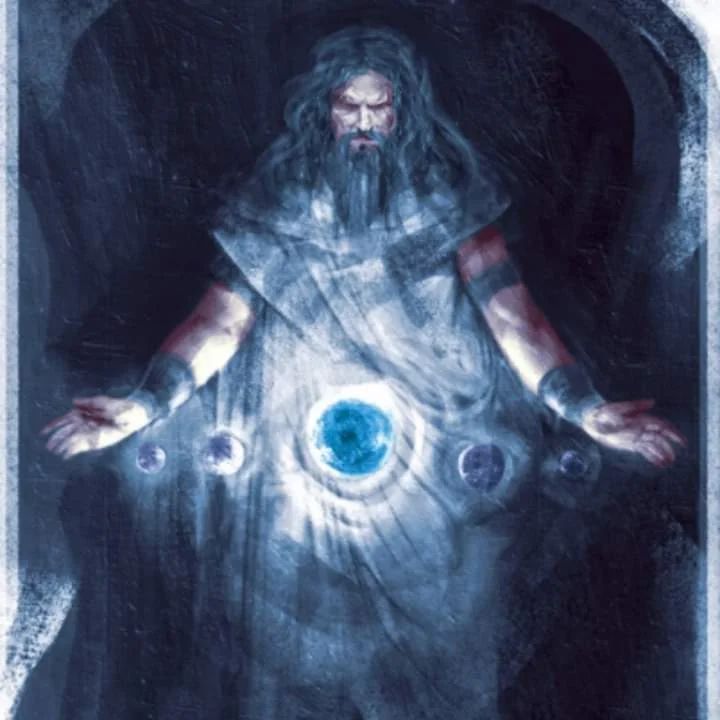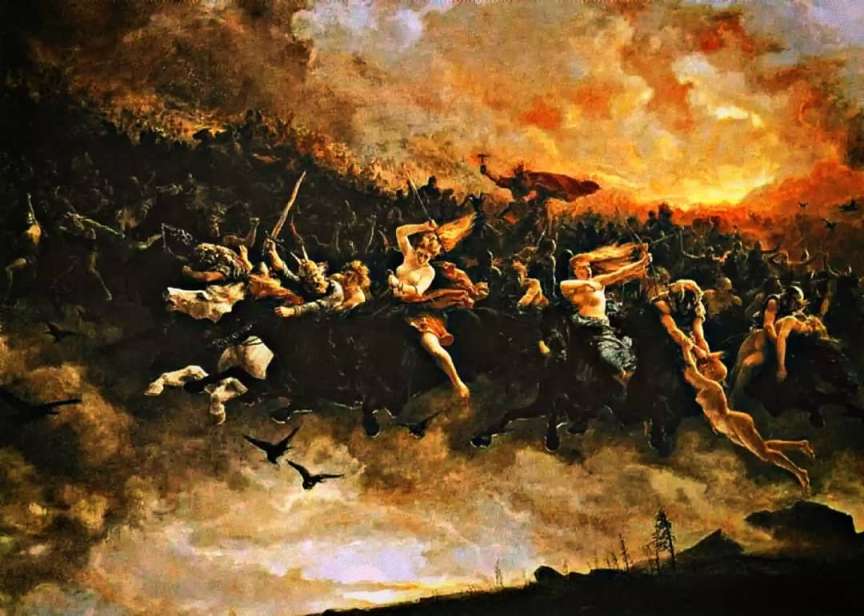Hoenir is the god of honor, mystery, prophecy and silence. Brother to Odin, he is one of the three gods that created the first humans.
Hoenir responsibilities
Decisiveness and determination, giving reason to mortals, prophecies, sanctity and silence
Associated Animals with Hoenir
A stork and a walrus
Hoenir weapon/domain of power
His birds of omen, passive nature, his world of silence

The creator of human reason
Hoenir is the obscure god of decisiveness and silence, also associated with honor, sanctity and omens. Brother to Odin, he is one of the three gods that created the first humans. Hoenir is known as ‘The Cloud God’, ‘The Mud King’, ‘The Soul God’, ‘The Silent One’, and ‘The Swift God’. Although little is known about Hoenir, the god of silence holds a prominent place in the Norse Pantheon.
The tale of the creation of humans has Odin, Hoenir and Lodurr arriving at a beach. There, they found two pieces of wood, from which they created the first humans. The man was named Ask and the woman Embla. To complete their creation, the three gods bestowed upon them a special gift. Odin gave them soul, Hoenir gave them reason and senses (spirit), and Lodurr gave them motion.
Thus Hoenir became the father of human intellect, inspiration and reason, as well as imprudence and madness. In some stories, Hoenir is mentioned as a traveling companion of Odin and Loki. One interesting fact about Hoenir is that he is often called the most fearful of all the gods.
The exchange and the decapitation
The information regarding Hoenir is too little, making him a mysterious god. He is often depicted as a great and handsome warrior; more like a wise than a confused deity. The best allusion to him is the story about the exchanged hostages between the Aesir and the Vanir.
After the war, Hoenir and Mimir were sent to the Vanir to seal the truce between the two divine tribes. At first, Hoenir impressed his hosts with his beauty and leadership skills that he was made a chieftain. But, as it turned out, Hoenir couldn’t do anything without first consulting Mimir about it.
Eventually, the Vanir saw this and became enraged. They felt they had been cheated and humiliated by the Aesir in the hostage exchange agreement. Betrayed as they were, the Vanir seized Mimir and decapitated him, sending his head back to the Aesir. After this, Hoenir’s fate remains a mystery. But, he is brought up again in the old texts as one of the few survivors of Ragnarok.
Play Fun Norse Quiz
Is this article making you even more curious about Norse gods and goddesses? You can satisfy your curiosity by playing a fun Norse mythology quiz. This way, you can test your knowledge about Norse gods and goddesses, as well as fill in some gaps. Good luck and have fun playing!
Don’t forget to try our other games as well!
In the old texts
In the Poetic Edda, in the poem Voluspa, Hoenir is one of the three gods that creates the first humans. He is later mentioned as one of the few gods that would survive Ragnarok.

In the Ynglinga saga, Hoenir and Mimir are sent to the Vanir to strengthen the peace between the divine tribes. Hoenir however doesn’t prove to be a reliable god, relying on Mimir for every decision.
Hoenir also appears in the poems Haustlong and Reginsmal.
Frequently Asked Questions
Q. Is Hoenir truly a powerful god?
A.‘Hoenir is one of the primordial Norse gods. He is a strong warrior and a powerful god. It takes a lot to be alongside Odin Allfather, especially when it comes to creating the first humans. Therefore, yes, Hoenir is an important deity in the Norse mythos. Even more so when he is called by scholars the most fearful of all the gods.
Q. Why Hoenir is so feeble-minded during his time with the Vanir?
A. Keep in mind that Hoenir is one of the few gods in the Norse mythology associated with prophecy. His so-called weakness while he was with the Vanir can be interpreted in many ways. Knowing what will come, and not desiring to affect the chain of events, it’s possible Hoenir acted as he did. To ensure his survival during the events of Ragnarok, Hoenir feigned he was an indecisive god. If that’s the case, poor Mimir was doomed to lose his head anyway.
